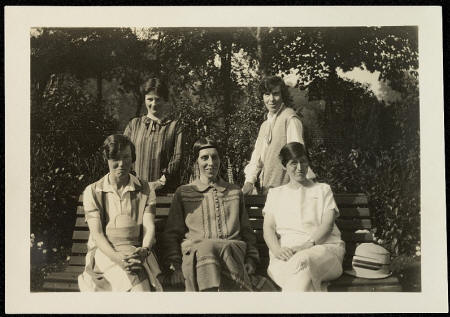

Partner Margery Fry
Queer Places:
Bryn Mawr College (Seven Sisters), 101 N Merion Ave, Bryn Mawr, PA 19010
1 Keats Grove, Hampstead, London NW3 2RP, UK
Golders Green Crematorium
Golders Green, London Borough of Barnet, Greater London, England
.jpg) Marjorie
Rackstraw (June 24, 1888 – April 28, 1981) was an educationalist and social
worker. She was a lifelong friend of the prison reformer Margery Fry,[1] Labour Councillor
for Hampstead in London,[2] and
undertook significant relief work before, during and after the Second World
War.[3]
Some time after graduating with an arts degree from the University of
Birmingham, Marjorie worked as a lecturer in education at the University of
Sheffield for several years.[4] She
was appointed warden of Masson Hall, University of Edinburgh, in 1924 and
General Advisor to Women Students at the University in 1927.[4]
Marjorie
Rackstraw (June 24, 1888 – April 28, 1981) was an educationalist and social
worker. She was a lifelong friend of the prison reformer Margery Fry,[1] Labour Councillor
for Hampstead in London,[2] and
undertook significant relief work before, during and after the Second World
War.[3]
Some time after graduating with an arts degree from the University of
Birmingham, Marjorie worked as a lecturer in education at the University of
Sheffield for several years.[4] She
was appointed warden of Masson Hall, University of Edinburgh, in 1924 and
General Advisor to Women Students at the University in 1927.[4]
Marjorie was born in Highgate, Middlesex on 24 June 1888 to Matthew Rackstraw and Fanny Blofeld, the second out of five children.[1] Her father was a tradesman who owned two shops on Upper Street, Islington, and her mother's family were dealers in Smithfield.[1] The family lived in a large house in Cholmondeley Park until their children left home.[1] As a young girl, Marjorie attended Grove School, Highgate, but transferred to a school for disabled children at Margate after developing spinal problems, possibly resulting from polio.[1] She continued to suffer from spinal troubles throughout her life.[1]
After a year in France,[1] Marjorie went on to study for an undifferentiated arts degree at the University of Birmingham.[2] It was during her time at Birmingham that she met Margery Fry, who was then warden of University House.[1] After her time at Birmingham she spent a year at Bryn Mawr College, Pennsylvania.[1]

Marjorie eventually returned to Birmingham to assist Margery Fry at University House.[1] When the older Margery left to work with the Friends' War Victims Relief Committee, Marjorie followed in her footsteps and began working with refugees on the Marne.[1] In 1920, Marjorie's relief work took her to Russia, where she worked through the famine.[1] In her autobiography, Unfinished Adventure: Selected Reminiscences from an Englishwoman's Life (1933), suffragist Evelyn Sharp describes Marjorie as fluent in Russian, efficient, and possessing "the sympathetic temperament of a leader" which led her to being "very popular with the members of the village Soviet and with all the Russians she had to deal with in her district."[5] After working as a lecturer in education at the University of Sheffield, Marjorie served as the warden of Masson Hall at the University of Edinburgh from 1924 to 1937.[4] In 1927, she was also appointed General Advisor to Women Students at the University.[4] In this capacity, she was personally responsible for interviewing the vast majority of women students not residing in halls or recognised hostels.[4] Upon her resignation from the post, Marjorie left a detailed guide for her successor, in which she noted: "The chief duties of the Adviser of Women Students are to give advice on careers, on general matters, and, where necessary, on accommodation.... She is concerned with the social life of the students generally and is responsible for keeping a Register of Lodgings which is reviewed every year. She is a member of the Appointments Board and of the Athletic Committee. She has an office in the Old College and the assistance of a part-time secretary."[4] In 1937, Marjorie entered into lengthy correspondence with Scottish suffragist Frances Melville, hoping to compile data from all the Scottish universities in order to advocate for women's potential in governmental service.[6] In response to concerns that "some parts of the world would be unsuitable for women to live in," Marjorie sought to gather information from female graduates with overseas experience about whether they had encountered difficulties because of their gender.[6]
Following her resignation from the University in 1937, Rackstraw moved to Hampstead, London, where she undertook more voluntary work, often linked with her local Labour party. In 1944 she began working with the United Nations Relief and Rehabilitation Administration in France and Germany. In 1945, she returned to Hampstead having been elected as a Labour Councillor, in which capacity she served until 1951. Rackstraw formed the Hampstead Old People's Housing Trust in 1947. The trust bought empty housing, and made it suitable for the accommodation of elderly people, many of whom had lost their homes through the Blitz. In 1968, the trust opened their first purpose built flats, named Rackstraw House. Rackstraw remained chairman of the trust until she was 79. She died at home on 28 April 1981.
My published books: